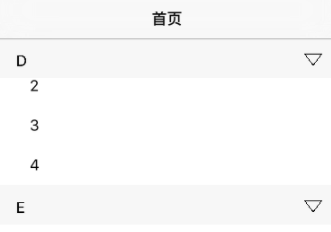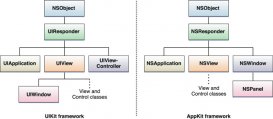单例模式是一种常用的软件设计模式。在它的核心结构中只包含一个被称为单例的特殊类。通过单例模式可以保证系统中一个类只有一个实例而且该实例易于外界访问,从而方便对实例个数的控制并节约系统资源。如果希望在系统中某个类的对象只能存在一个,单例模式是最好的解决方案。
1、书写步骤
1)、创建类方法,返回对象实例.以shared default current开头。
2)、创建一个全局变量用来保存对象的引用
3)、判断对象是否存在,若不存在,创建对象
2、具体单例模式的几种模式
第一种单例模式
|
1
2
3
4
5
6
7
8
9
10
11
12
13
14
15
|
//非线程安全写法static UserHelper * helper = nil;+ (UserHelper *)sharedUserHelper {if (helper == nil) {helper = [[UserHelper alloc] init];} return helper;} |
第二种单例模式
|
1
2
3
4
5
6
7
8
9
10
11
12
13
14
15
16
17
18
19
20
21
|
//线程安全写法1static UserHelper * helper = nil;+ (UserHelper *)sharedUserHelper { @synchronized(self) { if (helper == nil) { helper = [[UserHelper alloc] init]; } } return helper;} |
第三种单例模式
|
1
2
3
4
5
6
7
8
9
10
11
|
+ (void)initialize { if ([self class] == [UserHelper class]) { helper = [[UserHelper alloc] init]; }} |
第四种单例模式
|
1
2
3
4
5
6
7
8
9
10
11
12
13
14
15
16
17
18
19
20
21
|
//线程安全写法3(苹果推荐,主要用这个)static UserHelper * helper = nil;+ (UserHelper *)sharedUserHelper { static dispatch_once_t onceToken; dispatch_once(&onceToken, ^{ helper = [[UserHelper alloc] init]; }); return helper;} |
MRC全面实现单例写法(了解)
|
1
2
3
4
5
6
7
8
9
10
11
12
13
14
15
16
17
18
19
20
21
22
23
24
25
26
27
28
29
30
31
32
33
34
35
36
37
38
39
40
41
42
43
44
45
46
47
48
49
50
51
52
53
54
55
56
57
58
59
60
61
62
63
64
65
66
67
68
69
70
71
72
73
74
75
76
77
78
79
80
81
82
83
84
85
86
87
88
89
90
91
92
93
94
95
96
97
98
99
100
101
102
103
104
105
106
107
108
109
110
111
112
113
114
115
116
117
118
119
120
121
122
123
124
125
126
127
128
129
130
131
132
133
134
135
136
137
138
139
140
141
142
143
144
145
146
147
148
149
150
151
152
153
154
155
156
157
158
159
160
161
162
163
164
165
166
167
168
169
170
171
172
173
174
175
176
177
178
179
180
181
182
183
184
185
186
187
188
189
190
191
192
193
194
195
196
197
198
199
200
201
202
203
204
205
206
207
208
209
210
211
212
213
214
215
216
217
218
219
220
221
222
223
224
225
226
227
228
229
230
231
232
233
234
235
236
237
238
239
240
241
242
243
244
245
246
247
248
249
250
251
252
253
254
255
256
257
258
259
260
261
262
263
264
265
266
267
268
269
270
271
272
273
274
275
276
277
278
279
280
281
282
283
284
285
286
287
288
289
290
291
292
293
294
295
296
297
298
299
300
301
302
303
304
305
306
307
308
309
310
311
312
313
314
315
316
317
318
319
320
321
322
323
324
325
|
#import <Foundation/Foundation.h>#import "UserHelper.h" void func() { static dispatch_once_t onceToken; dispatch_once(&onceToken, ^{ NSLog(@"haha"); });} int main(int argc, const char * argv[]) { @autoreleasepool { // [UserHelper logout]; if ([UserHelper isLogin]) { UserHelper * helper = [UserHelper sharedUserHelper]; NSLog(@"username = %@ password = %@",helper.userName,helper.password); } else { char name[20]; char pwd[20]; NSLog(@"请输入用户名"); scanf("%s",name); NSLog(@"请输入密码"); scanf("%s",pwd); NSString * userName = [[NSString alloc] initWithUTF8String:name]; NSString * password = [[NSString alloc] initWithUTF8String:pwd]; if (userName && password) { [UserHelper loginWithUserName:userName password:password]; UserHelper * helper = [UserHelper sharedUserHelper]; NSLog(@"username = %@ password = %@",helper.userName,helper.password); } } // UserHelper * help1 = [UserHelper sharedUserHelper];// help1.userName = @"dahuan";// help1.password = @"123456";// NSLog(@"%p",help1);// NSLog(@"%@",help1.userName);// NSLog(@"%@",help1.password);//// // UserHelper * help2 = [UserHelper sharedUserHelper];// help2.password = @"zxc";// NSLog(@"%p",help2);// NSLog(@"%@",help1.userName);// NSLog(@"%@",help1.password); } return 0;} //class.h#import <Foundation/Foundation.h> @interface UserHelper : NSObject //1、创建类方法,返回对象实例 shared default current + (UserHelper *)sharedUserHelper; @property (nonatomic, copy) NSString * userName; @property (nonatomic, copy) NSString * password; + (BOOL)isLogin; + (void)loginWithUserName:(NSString *)userName password:(NSString *)password; + (void)logout; @end // class.m#import "UserHelper.h" //2、创建一个全局变量 #define Path @"/Users/dahuan/Desktop/data" static UserHelper * helper = nil; @implementation UserHelper //+ (void)initialize {// // if ([self class] == [UserHelper class]) {// helper = [[UserHelper alloc] init];// }//} + (UserHelper *)sharedUserHelper { //3、判断对象是否存在,若不存在,创建对象 //线程安全// @synchronized(self) {// // if (helper == nil) {// helper = [[UserHelper alloc] init];// }// } //gcd 线程安全 static dispatch_once_t onceToken; dispatch_once(&onceToken, ^{ helper = [[UserHelper alloc] init]; }); return helper;} - (instancetype)init { if (self = [super init]) { NSString * data = [NSString stringWithContentsOfFile:Path encoding:NSUTF8StringEncoding error:nil]; if (data) { NSArray * array = [data componentsSeparatedByString:@"-"]; _userName = array[0]; _password = array[1]; } } return self;} + (BOOL)isLogin { UserHelper * helper = [UserHelper sharedUserHelper]; if (helper.userName && helper.password) { return YES; } return NO;} + (void)loginWithUserName:(NSString *)userName password:(NSString *)password { UserHelper * helper = [UserHelper sharedUserHelper]; helper.userName = userName; helper.password = password; NSArray * array = @[userName,password]; NSString * data = [array componentsJoinedByString:@"-"]; [data writeToFile:Path atomically:YES encoding:NSUTF8StringEncoding error:nil];} + (void)logout { NSFileManager * fm = [NSFileManager defaultManager]; if ([fm fileExistsAtPath:Path]) { [fm removeItemAtPath:Path error:nil]; }} @end |
以上就是关于iOS单例模式的全部内容,希望对大家的学习有所帮助。
















